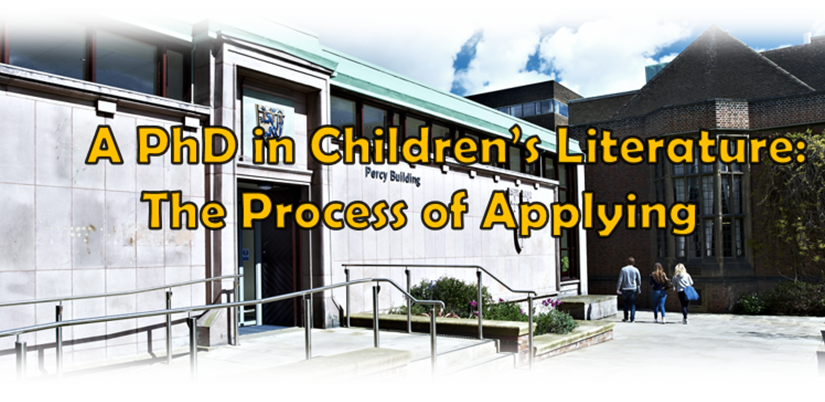Rebecca Jane Francis
So, you’re partway through your MA (or maybe finished a long time ago and want to go back to school again!), and you know that you want to do further study, and that you want that further study to be centred around children’s literature. But where do you start? How do you even begin tackling such a task? Maybe you’re in a one-year MA course, so you haven’t even handed in any papers yet – how can you go about applying for PhD?
Well, we here in Newcastle University’s CLU have been there! Here are some thoughts and suggestions on how to go about it.
First of all, and MOST importantly: THE APPICATION DEADLINES ARE MUCH EARLIER THAN YOU THINK THEY ARE. Yes, even earlier than that. Seriously. Especially as you probably have deadlines starting to come up in December and January as well, and you really don’t want to be trying to get your PhD applications in at the same time as you are writing your first MA papers. Put the deadlines in red in your diary, and then set reminders for them at least two weeks before. Check when any other deadlines or breaks you might be having are (as the applications are typically due across the Christmas holidays), and block out times when you will sit down to prepare for them.
But where do you want to apply to? You can’t start thinking about deadlines until you know where you are going, as every university has a different deadline and a different application process! Well, that’s actually quite a complicated question, so let me try to break it down for you.
There are two main ways to go about deciding where to study. The first is looking at universities that have a strong children’s literature unit. A good indicator for this is whether or not they offer MA courses specifically for children’s literature (or, failing that, at least an undergraduate course) and exploring things like library resources for children’s lit. The second is looking at the major critical works that have influenced your thinking and your desire to study children’s literature, and then seeing if any of those critics work at universities that you could attend. You should also look at what kind of funding opportunities the universities and the departments have!
Once you have a list of places you think might be feasible, spend time finding out about the university and the literature department as a whole. I know how hard this is to do from overseas, but chat forums and the school websites are helpful – if you can’t even navigate the website, it may not be the place for you! If you possibly can, try to visit the campus.
While you are doing this, you need to sort out a clear idea of what you actually want to study in your head. ‘Children’s Literature’ is a vast and multi-faceted area of study that crosses over several departments (literature, linguistics, history, psychology, etc) and covers several centuries and many different cultures. Is there a particular period or author that you are interested in? Why? Is there a problem that you think needs addressing? Are you interested particularly in a specific language or country, or want to do a cross-comparison of, for example, American and Canadian literature?
The next step is to get in contact with the researcher that you want to work with. Send a quick email, explaining who you are, what you are studying, what you want to study, and why you think that your work would fit with this researcher, and ask if they think that they might be interested in supervising your PhD project. If you are not applying straight from a one year MA, then ideally you should do this in the summer, as university teachers are very busy in September and October and it may take them some time to get back to you. Don’t worry too much if you can’t, though. It is KEY to do this: your supervisory relationship will be one of the most important things throughout the process of your PhD, so you should at least get a feel for what your supervisor might be like to work with. Do they reply in a timely manner? Do they seem enthusiastic? Do they want to hear about your thoughts, or does it feel like they might take over the project? All of these you can get a feel for relatively quickly!

In my own case, I emailed multiple places. I was politely turned down by one person, which is not unusual, and you should not let yourself get too down about. I was invited to a Skype meeting to discuss my research plans by two other researchers, which gave me a chance to get a feel for what supervisory sessions might feel like with them. It is also great to get that encouragement that someone in the field thinks that your ideas are worth exploring! I also got a wonderfully enthusiastic and very encouraging email from my now-current supervisor, who offered to look over drafts of any applications to the school or for funding.
Once you have someone you think that you could work with, and whose work aligns with yours, you need to write the application piece. If you have managed to make contact with a potential supervisor and have already established a rapport with them, ask them to check over your application before you send it in. IMPORTANT: Bear in mind that you will have to order transcripts from your school and that some universities still require that these be sent by post! Make sure that you order transcripts, for both UG and your Masters, well in advance of the deadline.
In terms of writing the main body of your application: every university will require different lengths and levels of detail. My suggestion is to write the longest one first, and polish that one to the best that you can. Then, once it is as good as you can make it, choose what to cut out for the other applications. Make it as PRECISE AS POSSIBLE. Discuss your own particular projects, mentioning critical works that you have already read, to show that this is not a pipe dream but something that you have put serious thought into and already know what some of the discussion around your chosen area is saying. If the word count allows for it, try to give draft chapter titles, and a brief idea of what the thesis would look like broken down into these chapters. At the end, spend a paragraph talking specifically about why you want to attend that particular university. Mention that you already have someone willing to supervise you, talk about library and archival resources, and about any relationships the university might have with outside groups (such as Newcastle University’s partnership with Seven Stories). Make it clear that you have done the research into the place itself and that you are enthusiastic about studying there.
Finally – send it in! Check that you have filled out everything that the university wants (multiple checklists may be required). Once you have done that, though, don’t just wait: you need to get your funding application deadlines in a row next! Most of these will not be due until after you know whether you have been accepted by the school, but some require earlier applications, so keep a careful eye out. Make sure that you keep going back to what you want to study, and thinking it through more, as some of the most comprehensive funding bodies (such as the AHRC) often want far more detail than the general school application, partly because they want to see that your thought processes have moved on since your initial application.
Good luck! I hope that this was helpful, and that your applications go as smoothly as possible!


This was a great read. Thank you for sharing your thoughts and experience about the application process.
May I ask what your previous schooling was? Did you do an MA or BA in children’s lit? How are you finding this course?
Thank you again!
Hi Ariel,
I’m doing my PhD in Children’s Lit here at Newcastle and I’d say it’s a great place to study. Very supportive staff and a great research culture. A lot of my colleagues did MAs or MLitts in Children’s Literature before coming here, but I didn’t. All my previous study is in English Literature – this meant familiarising myself with new concepts in my first year, but it was not really a disadvantage.
Helen